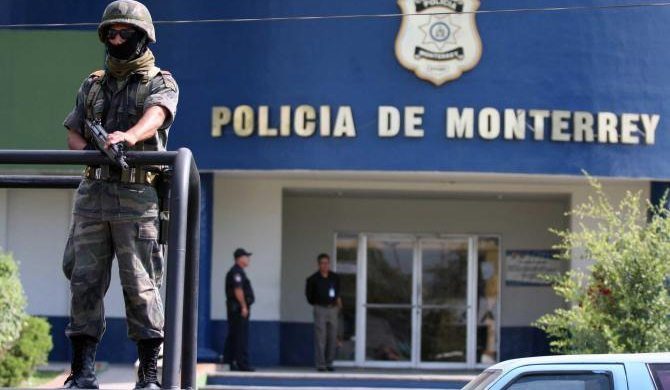Monterrey, Mexico – Authorities in the Mexican state of Nuevo León intend to recruit 11,000 officers in the coming years to bolter a recently created police force after acknowledging the existing one has been corrupted and infiltrated by organized crime.
“It’s a real challenge to recruit new police officers at such a complex time,” said Gov. Rodrigo Medina de la Cruz, as he announced the creation of a new state security force, the Fuerza Civil. “Because of this violence, we are now facing one of the most difficult situations we’ve ever experienced, and we have to admit that the security forces have not been up to the challenge that we’re facing.”
Nuevo León has witnessed an unprecedented wave of violence stemming from an ongoing dispute between drug cartels, which has led to a spike in crime. The insecurity reached a high point on Aug. 25, when criminals set fire to the Casino Royale in Monterrey, killing 52.
Statistics from the Nuevo León Attorney General’s Office show that two years ago there were 267 murders in the state. In 2010, the figure jumped to 828.
So far this year, the number already has surpassed 1,400.
In order to combat the rise in insecurity and violence, the state government has proposed the creation of a new police force capable of combatting drug cartels.
Currently, the state government relies on the country’s armed forces to fight the cartels.
President Felipe Calderón has proposed that states clean up their police forces, which are characterized by low pay, a lack of incentives, minimal training and frequent cooperation with organized crime, before he is to remove troops from narco-trafficking hotspots.
“In many cases, we’ve had to start from scratch,” Medina said. “Clean up the force, make an unprecedented effort to recruit new personnel, train and prepare them for a new form of policing based on intelligence, equip them and arm them sufficiently to cope with criminals carrying heavy firepower.”
Jorge Domene Zambrano, a spokesman for the state’s Security Council, said that during the past two weeks, soldiers and state authorities have been focused on “taking over” the force, in order to detain police officers involved in conspiring with organized crime and conduct investigations into alleged improprieties.
“Up to this point, we’ve detained 318 individuals who will undergo trustworthiness tests,” Domene Zambrano said.
“From among that group, we’ve rooted out 158 officers accused of various crimes.”
During the past two years, 3,200 officers have been dismissed from the force because they’ve been deemed untrustworthy. Of that total, 420 state and municipal police officers have been prosecuted for collaborating with drug cartels, officials said.
In order to create the Fuerza Civil, the salary offered to police officers, who used to earn approximately $6,000 pesos (US$448) per month, is being substantially increased. After training, the officers will earn a monthly salary of $14,000 pesos (US$1,046).
Officers also will receive a housing stipend, health insurance that can be used at both public and private hospitals, educational scholarships up to the undergraduate level at the best universities for them and their children, and life insurance, among other benefits.
The goal is to train at least 2,000 officers per year. The force has about 500 officers, with 700 recruits expected to graduate in the near future.
The creation of the Fuerza Civil is, at the very least, “a job offer that comes at a moment when unemployment is widespread throughout the world, and particularly in our country,” economist Lylia Palacios said.
José Juan Cervantes, who works as a university professor, agrees with Palacios, saying that starting from scratch is a good idea.
“It gains the trust of the people,” he said. “But the real results won’t be seen for at least five years.”
By Juan Alberto Cedillo for Infosurhoy



No comments:
Post a Comment